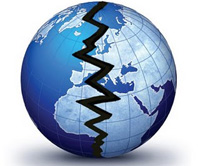Every Strong Quake Cuts Earth's Time
Nasa scientists suspect Chile's devastating earthquake may have speeded up the Earth's rotation and shortened the length of a day.

Researcher Richard Gross and his colleagues at Nasa's Jet Propulsion Laboratory in California calculated that Saturday's 8.8-magnitude quake could have cut 1.26 microseconds off the length of a day.
Not that anyone would notice however - as that's one-millionth of a second.
But why does movement in the Earth's crust give the planet an apparent turbo boost?
Brian Baptie, of the British Geological Survey, explains how the Earth's lack of rigidity is what allows changes to the planet's rotation - and the length of a day.
"The earth is not rigid and movements of its constituent parts, including the atmosphere and oceans, occur. These effects introduce a wobble - a movement of the Earth's axis - which is small but detectable," he says.
"A small wobble can be caused as a result of great earthquakes like the recent event in Chile and Indonesia on 26 December 2004, due to the movement of mass close to the earth's surface, but it will only be marginally detectable by the most sensitive instruments and is not a cause for concern."
Using the same mathematical model as it used for Chile, the Nasa team had estimated the 9.1 Sumatran earthquake in 2004 would have shortened a day by 6.8 microseconds.
BBC News has contributed to the report.
Subscribe to Pravda.Ru Telegram channel, Facebook, RSS!


